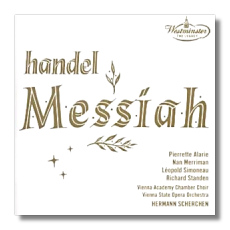
The Internet's Premier Classical Music Source
Related Links
- Handel Reviews
- Latest Reviews
- More Reviews
-
By Composer
-
Collections
DVD & Blu-ray
Books
Concert Reviews
Articles/Interviews
Software
Audio
Search Amazon
Recommended Links
Site News
 CD Review
CD Review
George Frideric Handel

Messiah
- Pierrette Alarie, soprano
- Nan Merriman, contralto
- Léopold Simoneau, tenor
- Richard Standen, bass
Vienna Academy Chamber Choir
Vienna State Opera Orchestra/Hermann Scherchen
Westminster 471232-2 ADD 3CDs: 65:58, 64:50, 61:43
Over the years, there have been all kinds of Messiahs on disc. There have been stern Teutonic Messiahs and thoroughly joyous Messiahs, Messiahs that might have sounded familiar to your Victorian forbears, and Messiahs that purported – in what might have been a hundred different ways – to be either what Handel might have intended or what Handel actually heard in 1742. We've even had Messiahs in German (thanks to Mozart) and gospel Messiahs – I think that the latter would have surprised old George Frideric Handel the most! Unwittingly, even I've added to the pile by being a member of an amateur choral society; our 2001 Messiah was taped, and clones of that are floating Lord knows where by now.
Scherchen's Messiah has more personality than it knows what to do with. You will note that this performance requires well over three hours. (Under two and a half hours is the norm in this age of the fleet and sweet "authentic" performance.) "The trumpet shall sound" crosses the finish line at 9:42. "I know that my Redeemer liveth" redeems itself in 10:28, and "He was despised" clocks in at a remarkable (some might say "despicable") 14:51. The final chorus goes from "Worthy is the Lamb" to the last "Amen" in 13:26 – the final fugue is done at about half the speed one is used to. Common time versus cut time issues add length, and so does the reinstatement of repeated material. On the other hand, numbers such as "And He shall purify" go by like mad, so one can't generalize and call Scherchen a "slow" conductor; if anything, his reputation was the opposite.
Predating Hogwood, Norrington, Gardiner, and the like, Scherchen was interested in knowing how Messiah was played during Handel's time, and this recording reflects Handel scholarship circa 1959. Rather than slavishly kowtowing to musicology (no "original instruments," for example – they were too unreliable in 1959), Scherchen picked and chose among alternatives to create a recording – his second, actually – in which there was "a sense of inner harmonious balance, in other words, the felicitous correspondence between all its various elements that only good taste can regulate." I'd say Scherchen succeeded, but his "good taste" also results in a recording that is more an impressive marble monument to the glory of the Lord than a vital, human dance of praise. But again, it's hard to generalize here. In "O death, where is thy sting?," Merriman and Simoneau whisper and tease like naughty children who have snuck into a Town Hall meeting.
Simoneau, with his pure and attractive tenor voice, is the real treasure among the soloists. His wife, Pierrette Alarie, adds more French-accented charm than character, but the essential sound of her voice is very easy on the ears. Merriman is more dramatic, and her hefty vibrato definitely makes "He was despised," among others, an imposing experience. Weakest of the four soloists is Richard Standen, who strains in "The trumpet shall sound" and slides between notes in a way that no longer passes muster. The smallish choir gives an inspired performance, and even in the most rapid sections they articulate all their notes cleanly. Anyone who has ever tried to sing "And He shall purify" at even half Scherchen's tempo knows how hard this is. When stretched by the conductor, the orchestra, however, has its less than stellar moments. If Scherchen conducted the final "Amens" any more slowly, for example, I think the violins would just give up rather than let out more strained and pallid sounds.
The engineering has held up very well, given that this is now a 43-year-old recording. The sound is warm and full, and also generous to the soloists.
I think this Messiah will give you a enjoyable jolt, no matter what side of the authentic performance debate you live on.
Copyright © 2002, Raymond Tuttle


















